News

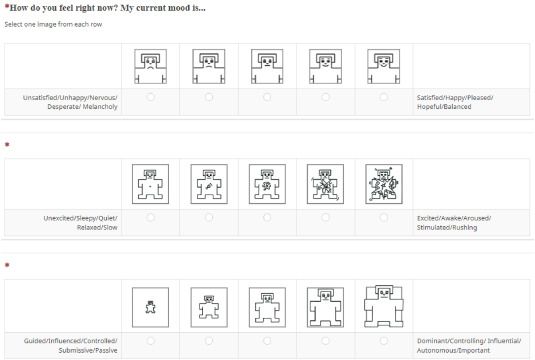

A New Article on “Citizens’ Perception and Emotion in Urban Environment: Model Development and Virtual Reality Experiment”.
A new article titled “Influences of Cognitive Appraisal and Individual Characteristics on Citizens’ Perception and Emotion in Urban Environment: Model Development and Virtual Reality Experiment” is published in the Journal of Environmental Psychology. The article is led by our PhD researcher Senqi Yang and co-authored by me (Gamze Dane), Pauline van den Berg, and Theo Arentze.
In this study, we developed a model that describes individuals’ emotion generation process in the built environment, drawing on multidisciplinary knowledge from AI (Computational Model of Emotion) and environmental psychology. The model was estimated with data collected through an online Virtual Reality experiment.
Our findings help to capture the dynamic process of diverse individuals’ experiences and will support experience-centered design decision-making. The results can be useful inputs for individual-level simulation and prediction, which we are currently working on.
The paper is now available on here.
Update: 02/05/2024


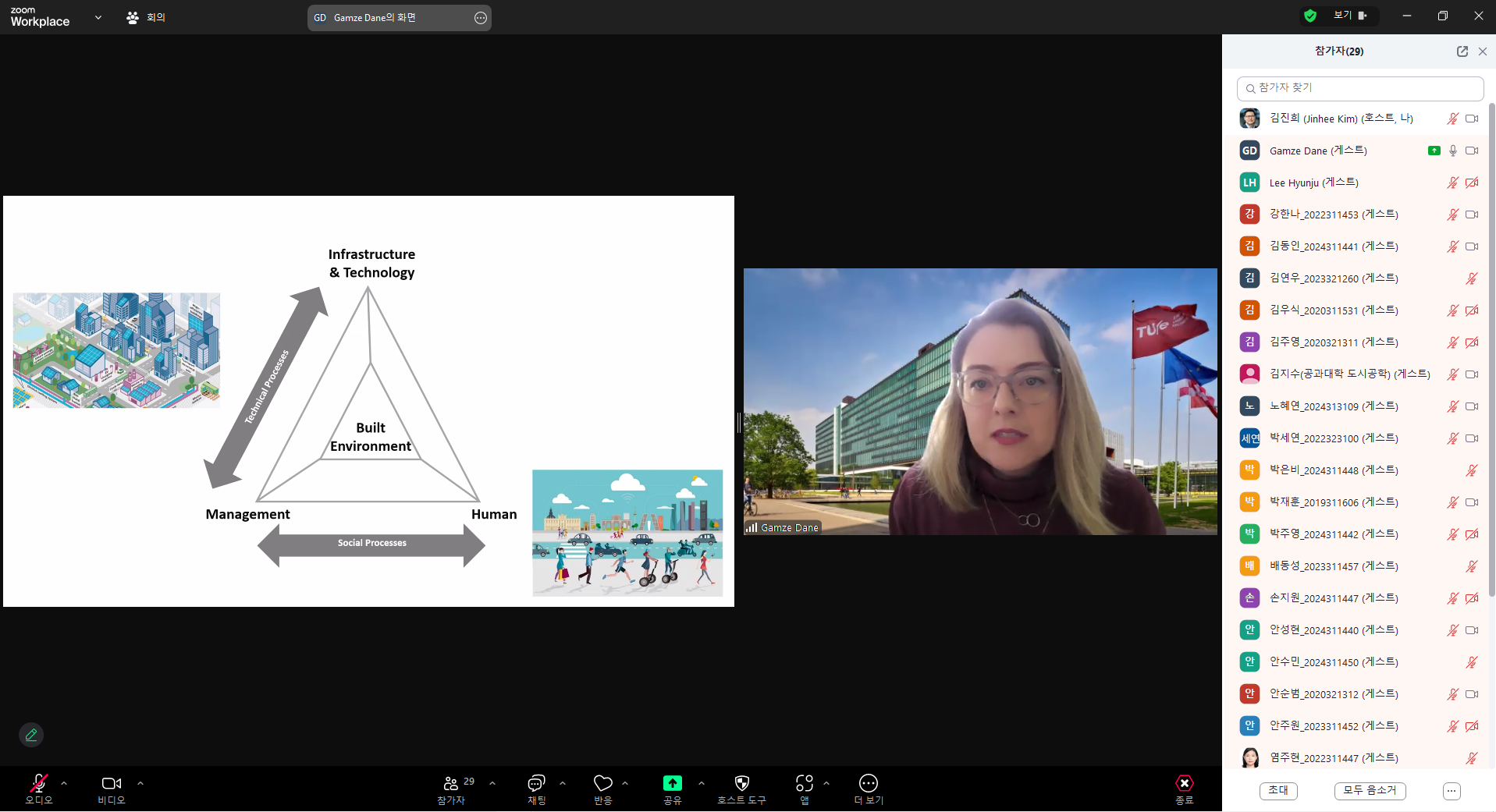

Online Lecture at the Department of Urban Planning and Engineering of Yonsei University in South Korea
On 25 April, I gave an online lecture on “Empowering Inclusive Urban Development through Digital Participatory Methods” to the graduate students of the Department of Urban Planning and Engineering of Yonsei University in South Korea. The lecture was organized for the Sustainable and Smart Regional Development for Inclusive Society graduate education program of the department. Approximately 30 graduate students, including MScs and PhDs, attended the lecture. It was a great pleasure to engage with students from one of the best universities in South Korea.
Many thanks to Dr. Jinhee Kim (Assoc. Prof. and Dean of the department) for inviting me and moderating the session.
Update: 25/04/2024





Sezi Karayazi successfully defended her Ph.D. thesis on 16 April!
On 16 April, Sezi Karayazi defended her Ph.D. thesis on “A Data-Driven Approach to Understanding Visitors’ Behavior to Reduce the Negative Effects of Tourism in Historical Cities“, supervised by Dr. Gamze Dane and Prof. Dr. Theo Arentze. This PhD thesis primarily focuses on enhancing the equal accessibility of urban heritage to reduce the spatial concentration of crowds in historical cities and emphasizes the importance of identifying alternative points of interest (POIs) for visitors as a strategy to alleviate overcrowding and promote lesser-known heritage sites. The main research gap lies in comprehending the factors that make certain areas attractive to certain types of visitors and how these factors can be harnessed to guide visitors toward alternative POIs. This research aims to obtain a better understanding of (i) the current behavior of visitors in a historical city and (ii) how we can address this question using revealed data derived from internet sources and complementary survey data.
Congrats Sezi, and good luck in your future career!
Update: 24/04/2024


Two Articles on Visitors’ Heritage Location Choices are out!
Two journal articles on Visitors’ Heritage Location Choices are published in the lead of my PhD student Sezi Karayazi.
The first article titled “Visitors’ Heritage Location Choices in Amsterdam in Times of Mass Tourism: A Latent Class Analysis” is published in the Journal of Heritage Tourism. This study aimed at identifying visitor segments based on their location choice behavior under the context of over-tourism challenges. For that purpose, a choice experiment was implemented and completed by 437 individuals who visited Amsterdam (our case area) in recent years. A latent class analysis revealed three segments of visitors that can be labeled as cultural-attraction seekers, selective sightseers, and city-life lovers. The results show that crowdedness and entrance fees for additional experiences significantly influence visitors’ location choices across all segments.
The second article titled “Analyzing the Influence of Visitor Types on Location Choices and Revisit Intentions in Urban Heritage Destinations” is published in the ISPRS International Journal of Geo-Information. This study investigated the location choice behavior of visitors in urban heritage areas in the context of overcrowdedness and visitor experiences. We looked at the relationship between visitor segments (identified in the first paper) and their choice of specific POIs, and the impact of visitors’ experiences on their intentions to revisit. In our case area Amsterdam, we identified relationships between various POIs, including popular museums such as the Rijksmuseum and Madame Tussauds, and different visitor segments such as “cultural attraction seekers”, “selective sightseers”, and “city-life lovers”. Our findings revealed that affective experiences, such as comfort, happiness, and annoyance, significantly influence visitors’ intentions to revisit.
Both articles are open access. Enjoy reading!
Update: 02/04/2024






Interdisciplinary Workshop on “Human-Emotional Agents in Urban Digital Twins for Healthy Cities: Challenges and Opportunities“
As part of the HEADS4HEALTH project funded by EWUU Alliance, a 2-day workshop on “Human-Emotional Agents in Urban Digital Twins for Healthy Cities: Challenges and Opportunities” was organized by Letícia Marçal Russo (UU), Judith Verstegen (UU), Gamze Dane (TU/e), Marco Helbich (UU) and Arend Ligtenberg (WUR). We aimed to facilitate an interdisciplinary discussion among professionals from different domains on “urban-scale digital twins and the integration of human representation in them”. Digital twin cities typically consist of 3D buildings but mostly lack the representation of humans. That is, they do not incorporate virtual citizens, i.e., software agents, that can experience the digital environment and react to it, as real citizens would. Incorporating agents in digital twins may allow testing of how these citizens would respond to possible urban design scenarios and how this new design scenario would affect their health and well-being.
In the workshop, we had presentations about best practices of urban digital twins (by Letícia Marçal Russo and Roland Geraerts), agent-based modeling (by Judith Verstegen), modeling experiences of humans in the built environment (by Gamze Dane and Senqi Yang), as well as interactive sessions about Human-Emotional Agents in Urban Digital Twins for Healthy Cities with our interdisciplinary group of participants from domains of geo-sciences and remote sensing, urban planning and design, landscape architecture, cognitive psychology, health demography, human geography, and computer science. (Participants: Agnes Patuano (WUR), Chris Janssen (UU), Gabriele Filomena (Uni of Liverpool), Kirsten de Beurs (WUR), Kristina Thompson (WUR), Mehdi Dastani (UU), Mila Koeva (UT), Pirouz Nourian (UT), Roland Geraerts (UU), Senqi Yang (TU/e))
Thanks to all participants for making this workshop a great event and we are looking forward to working together on our shared future agenda on the topic.
Update: 02/03/2024

Special Issue “Research on Smart Healthy Cities and Real Estate” in Buildings
My colleague Dr. Lisanne Bergefurt and I will be guest editors of the Special Issue “Research on Smart Healthy Cities and Real Estate” in the journal Buildings. We welcome papers that address the potential positive influence of smart technologies within cities and real estate (i.e., IoT and sensor networks, digital applications for citizen engagement) on people’s experiences and behavior. Additionally, we would like papers that emphasize the use of smart technologies for developing new design guidelines for the built environment. We aim for empirical papers on the perception of smart technologies within the built environment and also encourage the use of novel methods to make cities and real estate smarter and healthier. High-quality systematic reviews related to this topic are also welcome. The deadline for manuscript submissions is on the 30th September 2024. More information regarding the special issue and the journal can be found here.
Update: 23/02/2024



Invited Seminar “Digital Planning for Sustainable Urban Future” at Utrecht University
The seminar on “Digital Planning for Sustainable Urban Future”, organized by Yanliu Lin, Stan Geertman, Patrick Witte, and Nuno Pinto, was held on 24 January 2024 at Utrecht University. The hybrid seminar featured several engaging presentations and insightful discussions, covering new theoretical perspectives, innovative methodological approaches, and valuable lessons in digital planning. The presentations from the international community of digital planning highlighted the implementation and application of various digital technologies (e.g., digital twins, generative AI, virtual reality, social media, and planning support science) in planning processes and their profound impacts on sustainable development.
During the seminar, I gave a presentation on the CoHeSIVE project which received positive feedback resulting in follow-up discussions on future collaborations. Thanks to organizers for the productive seminar.
Update: 02/02/2024

3rd Hackathon of the Dutch Societal Innovation Hub (DSIH) was held in Eindhoven
3rd Hackathon of the Dutch Societal Innovation Hub (DSIH) was held in Eindhoven on 23 January 2024. DSIH project funded by the Digital Europe Program of the European Commissi`on and the Dutch Ministry of the Interior, aims to help cities and regions with major societal transformations using innovation, digitization and new technology. For that purpose, it focuses on Digital Twinning and Urban Platforms and their use for Sustainable, Safe and Healthy Cities by creating a multiple helix ecosystem where citizen participation is the center of attention.
During the 3rd Hackathon of DSIH, work groups of “ecosystem building”, “citizen science and participation”, and “integral urban planning” came together and engaged in activities to define a functioning 2024 DSIH program. In this project, TU/e is represented by me and Dena Kasraian.
Update: 27/01/2024

New Researcher, Carlos Campoverde, on the topic of Responsive Immersive Digital Twin for Public Space Design
Carlos Campoverde joined us at UDI to strengthen our urban digital twinning efforts in the Brainport region. During an 8-month project, he will develop a responsive immersive digital twin framework to support co-design and decision-making for public spaces. This project is an extension of the CoHeSIVE project. This will be a cross-university collaboration between the Department of Built Environment of the Eindhoven University of Technology (represented by Dr. Gamze Dane) and the Faculty of Geo-Information Science and Earth Observation of the University of Twente (represented by Dr. Pirouz Nourian and Dr. Mila Koeva).
We wish Carlos success in this journey!
Update: 02/12/2023
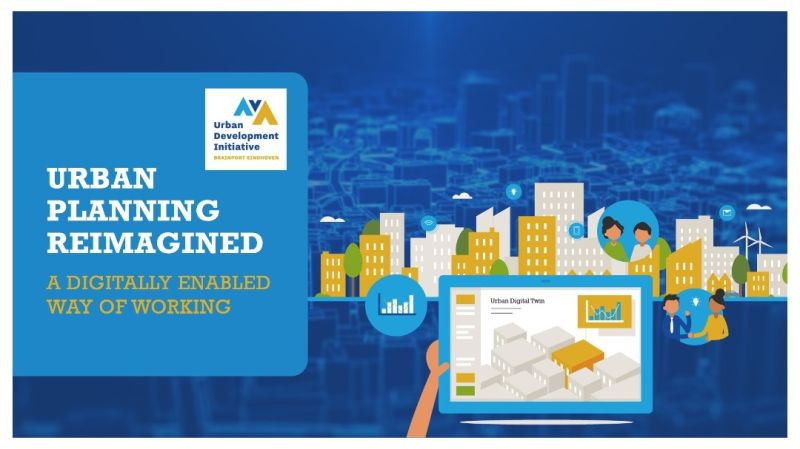
“Urban Planning Reimagined: a digitally enabled new way of working” our manifest at UDI is out!
The future is urban. It is also increasingly complex to plan for and manage. It is beyond the capabilities of any individual sector to solve multiple interrelated
environmental, socio-economic, and spatial challenges in a dynamic and complex multi-stakeholder system that faces an unpredictable future. Therefore, a holistic approach is needed to plan for future urban systems while considering the complexities and interdependencies of their many subsystems.
Fortunately, the digital revolution provides the potential for addressing this complexity and enables a new way of working for integrated urban planning.
In this manifest, we discuss how digitalization can change the way of working in urban planning processes to make it smarter, sustainable and inclusive.
Read the manifest here.
Update: 25/11/2023


Invited Lunch Lecture at Center for Urban Science and Policy at Delft University of Technology
I was invited to give a lunch lecture on the topic of “Empowering Inclusive Urban Development through Digital Participatory Methods”, as part of the Centre of Urban Science & Policy events at Delft University of Technology. The lecture took place on 21 November, at the Department of Technology, Policy and Management, and it was also open to researchers from the Department of Architecture and Built Environment of TU Delft.
Thanks to Trivik Verma for inviting me and organizing this lecture!
Update: 23/11/2023




Presentation at DIGITAL (T)WIN IT seminar of Digital Twin GeoHub
I joined the seminar “DIGITAL (T)WIN IT” on October 19-20, 2023, in Enschede in the Netherlands, as part of the Digital Twin Geohub events at the University of Twente. The seminar was a practical overview of the development and applications of City Digital Twins with expert speakers from academia, government, and industry.
As a contribution to this seminar, I gave a talk on Friday, October 20 on “The Use of Virtual Reality for Urban Design and Planning”. The recordings of the seminar can be found here.
Thanks to Mila Koeva and her team for organizing this inspiring event!
Update: 08/11/2023


Vacancy for Researcher Position on “AI-based Decision Support Systems for Urban Development“
Are you passionate about leveraging cutting-edge AI technologies to support urban development processes for building smarter, sustainable, and livable cities? If you’re motivated by the prospect of creating AI-based Decision Support Systems that empower informed decision-making for the cities of the future, we invite you to apply for this job. Collaborate with a team of researchers and our public and private partners, and make an impact in our region and beyond.
For more information on the job and application procedure, please see here! The deadline is 26 October 2023.
Update: 04/10/2023


New EngD Student, Golnoosh Sabahifard, on the topic of Human-centered Urban Digital Twinning
A new EngD student, Golnoosh Sabahifard, joined to strengthen our urban digital twinning efforts in the Brainport region. During a 2-year project, she will develop a human-centered urban digital twin framework for supporting decision-making in the Brainport region. We thank our funder Eindhoven Engine and Paul Desmedt for starting this cross-departmental collaboration between Industrial Design (Prof. Dr. Regina Bernhaupt) and Built Environment (Dr. Dena Kasraian & myself-Dr. Gamze Dane).
We wish her success in this EngD journey!
Update: 16/09/2023




Research Visit at Urban Analytics Lab of National University of Singapore
As a visiting scholar, I was at the Urban Analytics Lab (led by Dr. Filip Biljecki) of the National University of Singapore (NUS) for two weeks in August. Urban Analytics Lab (UAL) focuses on developing innovative methods, datasets, and software to advance data-driven urban planning, digital twins, and geospatial technologies in building and managing the smart cities of tomorrow.
During my visit, I gave a lecture to the Department of Architecture at NUS on “Experiencing the Future of Cities through Virtual Reality” where I focused on my recent research activities about the use of Virtual Reality for urban studies. Additionally, I had the opportunity to have bilateral meetings with other principal investigators such as Prateek Bansal (Behavioural & Cognitive Science Lab), Clayton Miller (Building and Urban Data Science Lab), and Yuan Chao (Urban Climate Design Lab) with whom we discussed possible future collaborations.
I also had the opportunity to join an event on “Urban Digital Twins and Data-driven Decision Making” organized by the Netherlands Innovation Network Singapore and the Singapore Urban Redevelopment Agency. As a follow-up to this event, we will explore the possibilities for future cooperation between Dutch and Singaporean academic and governmental institutions.
Thanks to Filip Biljecki and his team for the hospitality! Looking forward to enhancing our collaborations.
Update: 30/08/2023



CoHeSIVE interactive immersive virtual reality app is at National XR Day!
The CoHeSIVE application which aims to support citizen participation for the design of public spaces through an interactive immersive virtual reality solution, will be demonstrated at the National XR Day in Delft on July 5. The demonstration of the CoHeSIVE app will be done by project researcher Suzan Evers at Demo Area 2 between 12:00 and 16:00.
The CoHeSIVE project (funded by EWUU) has investigated how an Immersive VR app can be developed with people and for people, and can be used for participatory design processes of healthy public spaces. The developed application (CoHeSIVE app) includes an innovative methodology to incorporate intuitive design decisions based on inflicted adjustments in a simulated environment. The application automatically generates new design scenarios by combining different pre-composed design elements based on people’s selection. This is done to understand and discuss the preferences of individuals and groups for new, not yet existing scenarios.
Update: 22/06/2023


PhD researcher Senqi Yang presented her project at ICEP 2023 Conference!
PhD researcher Senqi Yang presented the first findings from her PhD project at the International Conference on Environmental Psychology (ICEP2023), with the presentation titled: “Influences of cognitive appraisal and individual characteristics on citizens’ perception and emotion in the urban environment: model development and VR experiment”, co-authored by Gamze Dane, Pauline van den Berg and Theo Arentze.
In her research, so far, she developed an integrative framework to model individuals’ experiences of urban spaces by focusing on individuals’ perceptions (safety, liveliness, comfort, and legibility) and emotions (pleasure, arousal, dominance) toward urban environment attributes. To test this model through path analysis, she collected data via a self-developed online virtual reality (VR) experiment.
Update: 01/07/2023





Presence at the AGILE 2023 Conference with a workshop and a presentation
During the AGILE (The Association of Geographic Information Laboratories in Europe) Conference 2023 that took place between 13 and 16 June in Delft, I was present with
– a workshop on “Digital Serious Games: Toward a Design Framework” organized by Gamze Dane (TU/e), Maryam Ghodsvali (TU/e), and Alexander Klippel and Jiayan Zhao (WUR GRS Lab). The aim of the workshop was to start a discussion toward a design framework for (Spatial) Digital Serious Games (DSGs) – a playful and engaging mode of digital twins – that deal with the complexity of spatial decision-making, by gathering a scientific community that can provide feedback on accessibility, adaptability and reusability of data, game mechanics and visualization techniques of DSGs.
During the interactive workshop with discussions, we also had presentations of DSGs from
- Harald Warmelink (BUAS) with Maritime Spatial Planning Challenge,
- Pirouz Nourian (UTwente) with GoDesign and EquiCity ,
- Maryam Ghodsvali (TU/e) with Spatial Nexus Optimization Game (SNOG).
The immense input we gathered while preparing and during the workshop will be summarized and shared soon.
– a presentation of our short paper “Designing healthy public spaces: A participatory approach through immersive virtual reality“, authored by Evers, S., Dane, G., et al. was done. The session chaired by Robert Weibel was lively with interesting presentations and an engaged large audience. Our paper can be accessed here.
Update: 15/06/2023

Our former PhD researcher Maryam Ghodsvali has been nominated for “Best PHD Thesis Award” at Eindhoven University of Technology!
Maryam Ghodsvali has been nominated for the prestigious ‘Best PhD Thesis Award 2023’ at Eindhoven University of Technology, with her work “A Transdisciplinary Decision-Making Approach to Food-Water-Energy Nexus: A Guide towards Sustainable Development”.
In her PhD research, Maryam developed a digital serious game called “Spatial Nexus Optimization Game (S.N.O.G.)” that supports a variety of stakeholders in the decision-making process of Food-Water-Energy nexus spatial interventions. Maryam’s PhD research was supervised by me (Gamze Dane) and Bauke de Vries.
To learn more about Maryam’s work and the other nominees and access their pitches, see here.
Update: 08/06/2023

Presentation of CoHeSIVE project at the EAISI Health Theme Meeting
On June 5th, I presented the EWUU-funded CoHeSIVE project which aims to support citizen participation through an immersive virtual reality (VR) application for the design of healthy public spaces. The presentation contributed to the regular activities of the Eindhoven Artificial Intelligence Systems Institute (EAISI) Health Theme.
The CoHeSIVE project has investigated how an Immersive VR tool can be developed with people and for people and can be used for participatory design processes of healthy public spaces. The developed application (CoHeSIVE app) includes an innovative methodology to incorporate intuitive design decisions based on inflicted adjustments in a simulated environment. The application automatically generates new design scenarios by combining different pre-composed design elements based on people’s selection. This is done to understand and discuss the preferences of individuals and groups for new, not yet existing scenarios. The CoHeSIVE app also provides a platform for behavioral studies in terms of understanding users’ experiences and interactions within the immersive environment through tracking head movements, clicks and navigation.
Update: 08/06/2023

Bruno Ávila Eça de Matos successfully defended his EngD thesis
On May 15th, Bruno defended his thesis “Digital Twins for Cities” and successfully received his EngD degree. In his EngD thesis, Bruno looked into the emerging concept of “Urban Digital Twins (UDTs)” which are digital replicas of physical, social, and environmental processes in cities, and, UDTs are used for monitoring, simulation, and management of urban environments. Bruno made an assessment of UDT cases around the globe in terms of their maturity level, use cases, and openness. Furthermore, he developed a guideline for creating and implementing digital twins of cities.
His EngD thesis was a collaboration with the company GeoDan (specialized on GIS & Digital Twins). Bruno was supervised by me (Gamze Dane), Bauke de Vries and Tom van Tilburg. His thesis can be accessed from here.
Update: 08/06/2023




Presented 2 projects at NWO ICT.Open 2023 Conference
We joined NWO ICT.Open 2023 Conference on 20 April for presenting two research projects.
Suzan Evers and I made a demo presentation of our CoHeSIVE app, an Immersive Virtual Reality application developed for the participatory design of public spaces. We were also happy that our demo presentation was nominated for the best demo award as one of the nine selected demos out of 29.
Maryam Ghodsvali made an oral presentation of a part of her Ph.D. project “Spatial Nexus Optimization Game (S.N.O.G.)” supervised by me and Bauke de Vries. S.N.O.G. is an online serious game that supports a variety of stakeholders in the decision-making process of Food-Water-Energy nexus spatial interventions.
Update: 22/04/2023




EU-funded Dutch Societal Innovation Hub (DSIH) project kicked off in Rotterdam!
DSIH project funded by the Digital Europe Program of the European Commission and the Dutch Ministry of the Interior, aims to help cities and regions with major societal transformations using innovation, digitization and new technology. For that purpose, it focuses on Digital Twinning and Urban Platforms and their use for Sustainable, Safe and Healthy Cities by creating a multiple helix ecosystem where citizen participation is the center of attention.
DSIH is led by 2 public organizations (VNG and IPO), representing local and regional players, and 5 private parties that focus on the needs of public services, namely: Brightland Smart Services Campus, Data and Knowledge Hub Healthy Urban Living, Digicampus, Municipality of Rotterdam and the Urban Development Initiative (UDI). Each party brings its own experience from existing projects, test and experimentation facilities and a decentralized public-private network.
TU/e is involved in the project as a founding partner of UDI and is represented by Dena Kasraian and myself.
Update: 07/04/2023

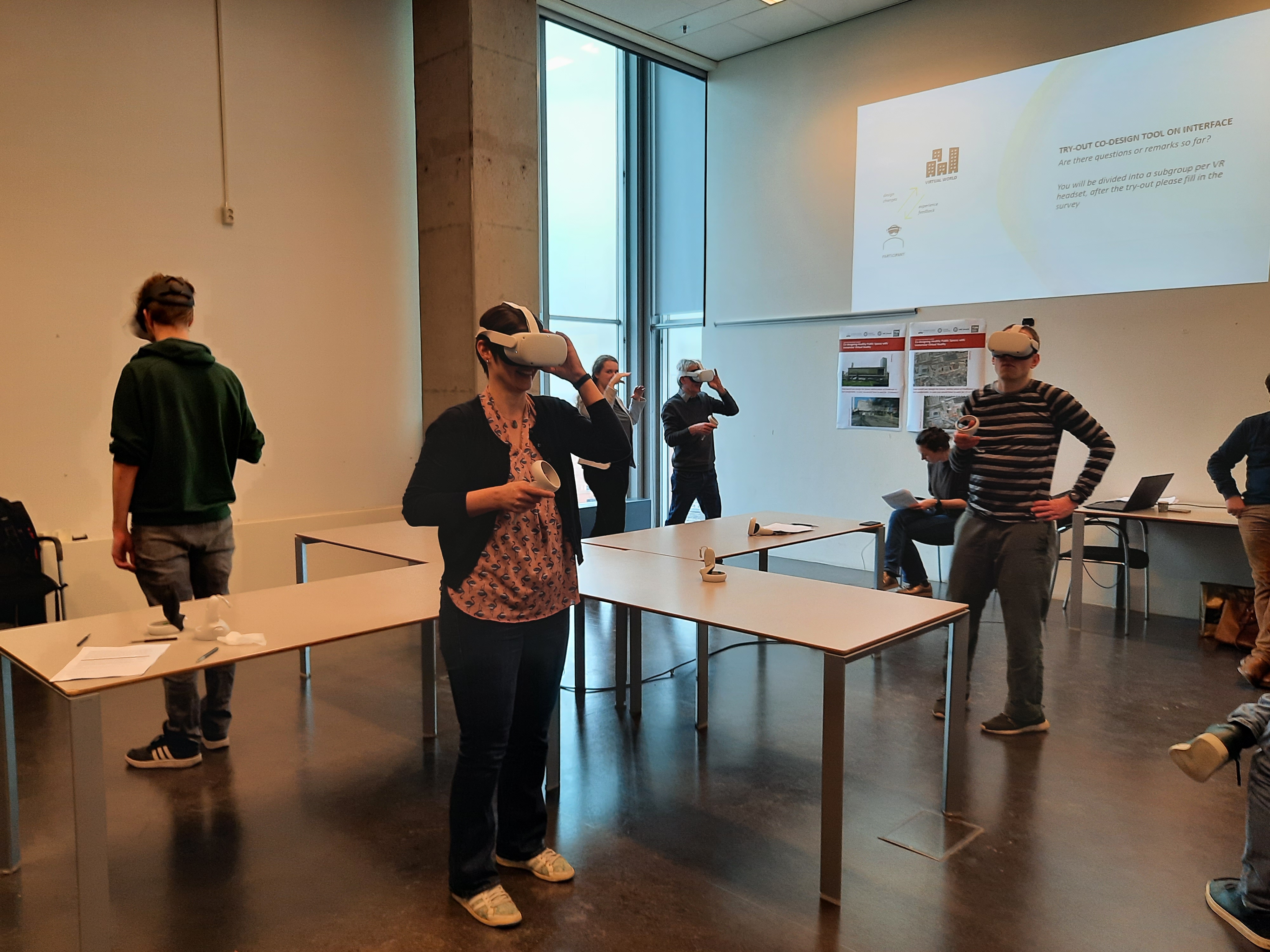

3rd Workshop of CoHeSIVE Project was held
On March 22, we held the 3rd workshop of CoHeSIVE (Co-designing Healthy Public Spaces via Immersive Virtual Environments) project.
During the workshop, we tested our CoHeSIVE app, an Immersive Virtual Reality application developed for the participatory design of public spaces. It aims to support participatory design processes by allowing users to explore, create and discuss different design options for healthy public space design. We hosted 30 participants in order to test the app and its use for participatory design. It was great to have a diverse group of participants from academia, municipalities, citizen initiatives, and design companies. We co-created ideas to further investigate and develop the application.
Update: 22/03/2023

PhD researcher Benshuo Wang successfully defended his thesis on 30 November!
On 30 November, Benshuo Wang defended his Ph.D. thesis on “Increasing awareness of urban cultural heritage using digital technologies: Empirical design and analysis of a new multi-media web platform“, supervised by Dr. Gamze Dane and Prof. Dr. Theo Arentze. The thesis addressed two shortcomings: (i) Existing ICT platforms for cultural heritage are usually developed without explicitly considering potential users’ preferences on content, media types and functionalities offered, (ii) It is not thoroughly researched to what extent the dedicated ICT platforms developed for cultural heritage sites fulfill their intended purposes (increasing knowledge, awareness and experience). To fill these research gaps, the objective of this thesis was to design and test a dedicated multi-media web platform prototype and analyze the effectiveness of such a platform to enhance experiences and increase the public’s awareness of cultural heritage. Congrats Benshuo!
Update: 30/11/2022

Seminar at Urban Analytics Lab of the National University of Singapore (NUS)
On 25 November, I gave a seminar at the Urban Analytics Lab (UAL) of NUS, on my current research interests under the title of “The Role of Digital Tools and Data for Citizen Engagement and Participatory Planning“. My talk covered the topics of (i) developing and applying digital tools and citizen science methods for supporting public participation and citizen engagement in urban transformation processes, (ii) performing urban (big) data science within people as sensors concept for understanding and predicting citizens’ behavior, opinions and experiences towards urban interventions. Many thanks to Filip Biljecki and Marcel Ignatius for hosting me.
Update: 28/11/2022




Joined as a panelist to the “Co-shaping future cities: towards a healthy environment” discussion at Preventive Health Conference
On 23 November, I joined as a panelist in the “Co-shaping future cities: towards a healthy environment” discussion at Preventive Health Conference organized by the EWUU alliance. During the panel discussion, I brought my perspective on how digital tools (such as digital twins) and urban data can support active behavior and healthy urban environments.
Update: 28/11/2022




2nd Workshop of CoHeSIVE Project was held
On 21 November, we (with Suzan Evers and Pauline van den Berg) organized the 2nd workshop of CoHeSIVE (Codesigning Healthy Public Spaces via Immersive Virtual Environments) project funded by alliance TU/e, WUR, UU, UMC Utrecht (EWUU). In this workshop, with 20 participants, we evaluated the first prototype of the developed codesign tool and discussed possibilities to further enhance it. We look forward to the next steps. Many thanks to our colleagues from WUR (Alexander Klippel, Timon Verduijn, Orkun Cagri Tekeli) and UMC (Yvonne Vendrih – de Punder) for the pleasant and fruitful collaboration.
Update: 22/11/2022


Talked about Public Space Design at DRIVE Festival during Dutch Design Week 2022
On 25 October, at DRIVE Festival during Dutch Design Week 22, I talked about our recent research on the impact of public space design on citizens’ well-being and how digital tools can help to integrate citizens into public space design. The recording of the livestream can be watched here.
Update: 27/10/202


Ph.D. researcher Sezi Karayazi presented her work at 7th Smart Data Smart Cities & 17th 3D GeoInfo Joint International Conference
Ph.D. researcher Sezi Karayazi was at the 7th Smart Data Smart Cities & 17th 3D GeoInfo Joint International Conference at UNSW Sydney Australia, where she presented our work “An Exploration of Interactions Between Urban Heritages and Tourist’s Digital Footprint: Network and Textual Analysis via Geotagged Flickr Data in Amsterdam”. If you wish to explore how we utilized the social media data for overtourism issue, you can access the paper here: https://lnkd.in/eWkb7gPm .
Update: 27/10/2022


New paper on “An online serious game for decision-making on food-water-energy nexus policy”
Have you ever thought of serious games as effective means of decision-making for urban developments? In this new paper led by Maryam Ghodsvali, we developed a serious game, namely S.N.O.G., for integrated decision-making on food-water-energy resource management. In S.N.O.G., the problem is divided into manageable interventions (i.e., policies) expressing the ground situation spatially in order to allow players to learn by doing. In an interactive and entertaining way, players learn about the complex interplay of the multiple disciplines that need to be integrated in order to properly manage the resources and subsequently the environment and the society. Find the full article here.
Update: 27/10/2022

Joining Talk Show at the Design Research & Innovation Festival
On 25 October, I will speak at the Design Research & Innovation (DRIVE) Festival. My talk will be about our recent research on the impact of public space design on citizens’ well-being and how digital tools can help to integrate citizens into public space design. DRIVE Festival which is organized by CLICKNL and 4TU.Design United, will take place in De Effenaar and streamed online, during the Dutch Design Week in Eindhoven. You can sign up here.
Update: 01/09/2022

A Visit to “WANDER Lab” at Wageningen University
As the CoHeSIVE project team, we visited our partner WANDER Lab of Wageningen University. WANDER Lab develops 3D visualizations and immersive experiences (i.e. #VR, #AR, #XR, #webplatforms) for content-driven researchers. It was great to experience all the immersive tech tools with interesting use cases and to brainstorm about CoHeSIVE’s tool. Looking forward to a more intense collaboration.
Update: 04/08/2022

A Visit to “Experience Lab” at Breda University
As a small group of researchers from TU/e, we were invited to visit the Experience Lab at Breda University and their guest lecturer Dr. Amit Birenboim from the Hebrew University of Jerusalem on 7 July. We had a fun and fruitful day with discussions on experiencing the built environment, lectures on the use of digital tools for measuring experiences, and experimenting with the lab toys (#VR, #skinconductance, #EEG, etc.). Looking forward to our further collaborations.
Update: 08/07/2022

First Workshop of CoHeSIVE project
First workshop of CoHeSIVE (Codesigning Healthy Public Spaces via Immersive Virtual Environments) project was conducted online on 6 July. This workshop focused on identifying the attributes and characteristics of health-stimulating public spaces. The workshop enabled discussions on good/bad public space practices, and future public space design of Eindhoven Station area (case are of CoHeSIVE project). The attendees were representing a citizen initiative from Eindhoven, UDI, the municipality of Eindhoven and TU/e.
Update: 08/07/2022

Ph.D. Maryam Ghodsvali defended her thesis successfully on 5 July 2022!
Maryam Ghodsvali successfully defended her Ph.D. thesis titled “A transdisciplinary decision-making approach to food-water-energy nexus: A guide towards sustainable development” on 5 July. This PhD research approached transdisciplinary decision-making problem for the food-water-energy nexus in four steps: (1) understanding key drivers for an integrated…
Update: 08/07/2022

New Project! CoHeSIVE: Co-designing Healthy Public Spaces via Immersive Virtual Environments
Co-designing Healthy Public Spaces via Immersive Virtual Environments (CoHeSIVE) has been funded by the EWUU alliance. CoHeSIVE aims to develop a co-design methodology that considers place-specific attributes, the variety of user groups, and their needs via the immersive virtual environment (IVE) technology and citizen-centric data.
Update:20/05/2022

Ph.D. researcher Sezi Karayazi received the ISPRS travel award
Ph.D. researcher Sezi Karayazi has won the IJGI 2022 Travel Award granted by the ISPRS International Journal of Geo-Information (IJGI), with her project.
Update: 11/05/2022

Ph.D. researcher Maryam Ghodsvali is at International Conference on Water-Energy-Food Nexus
Ph.D. researcher Maryam Ghodsvali will host a discussion table at International Conference on ‘Water-Energy-Food Nexus in Cities’ on May 12 in Almere, the Netherlands. She will also present the online serious game she developed for Water-Energy-Food nexus spatial optimization in Brainport Smart District in Helmond, the Netherlands.
Update:11/05/2022
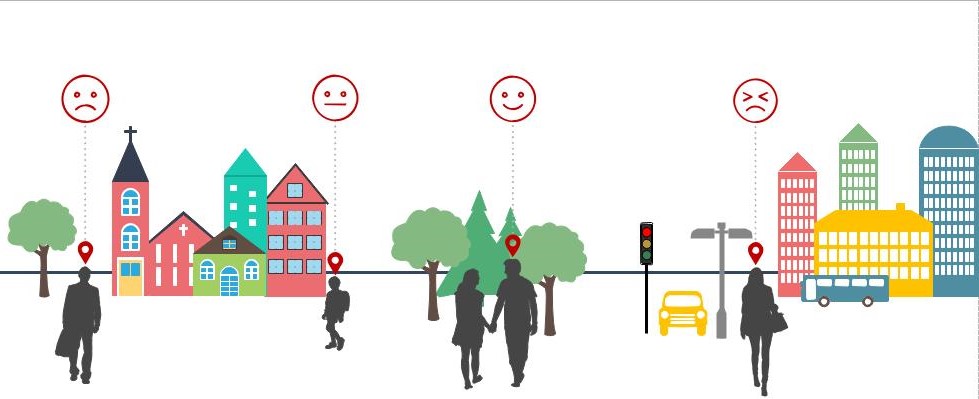
Special Issue 2nd Edition: Experiencing the City is now open
The 2nd edition of the special issue on Experiencing the City: The Relation between Urban Design and People’s Wellbeing at the International Journal of Environmental Research and Public Health is now open until 31 July 2022.
Update:05/11/2021

Sander de Meij’s master graduation project is at Dutch Design Week 2021
Student Sander de Meij’s master graduation project which I supervised together with Milos Viktorovic has been selected for the Dutch Design Week 2021 Drivers of Change Exhibition. In his project, Sander developed a web tool that provides location-based health index…
Update:05/11/2021

“Interactive Cultural Heritage Map of Strijp-S” has been launched
Interactive Cultural Heritage Map of Strijp-S”, a new digital resource for exploring the heritage of Strijp-S district in Eindhoven has been launched. This multi-media web platform can be accessed …
Update:05/11/2021
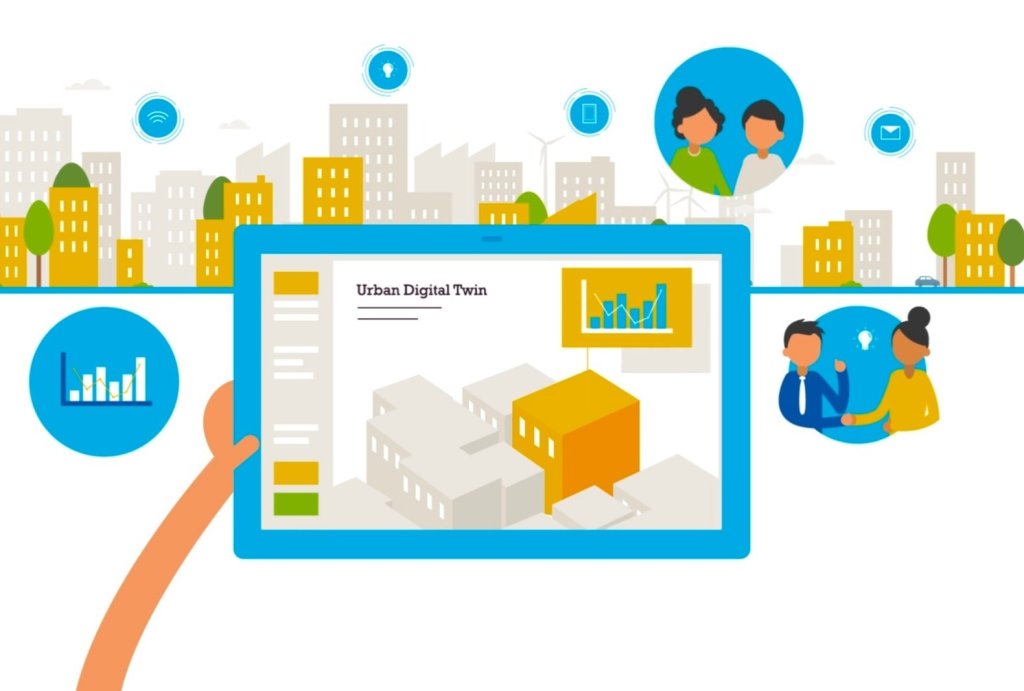
Urban Development Initiative (UDI)’s Digital City Program has been launched
Urban Development Initiative (UDI)’s Digital City Program has been launched in July 2021. This program focuses on citizen-centered and evidence-based urban planning and design with the support of digital tools such as digital twins, virtual reality, sensor applications and big (spatial) data analytics. In this program…
Update:05/11/2021

Boost! Project – Virtual TU/e Built Environment Community
Boost! Project “Virtual TU/e Built Environment Community” received funding in June, 2020. The project has been initiated by Dena Kasraian, Pieter van Wesemael and myself. The project aims to develop a digital…
Update:05/11/2021

Webinar “Experiencing the City”
Webinar “Experiencing the City” was held on 25 May. The webinar focused on the questions “How do people experience the cities? and How can methods like #virtualreality, #geoinformatics and #surveys help to measure and quantify people’s experiences in cities?”. During the webinar, chaired by Gamze Dane, speakers Amit Birenboim,…
Update:05/11/2021




Citizen Science Experiment for Accessible Bologna
ROCK project TU/e team was in Bologna Living Lab, experimenting GPS-enabled participatory mapping with citizens in order to identify people’s flow, spatial barriers, and points of interest in the university area. Citizens joining the experiment were recruited via Bologna Living Lab and included a variety of socio-demographic backgrounds, e.g. vulnerable groups and students. Please check the video and the paper for more information.
Update:05/11/2021

Gamze is at the webinar “Information Systems: Protecting the Past, Securing the Future”
On July 2, 2020, Gamze has joined the webinar “Information Systems: Protecting the past, securing the future” that was organized by ICOMOS and National Trust for Canada. Gamze, together with Martina Massari from the University of Bologna, has talked about the European H2020…
Update:05/11/2021